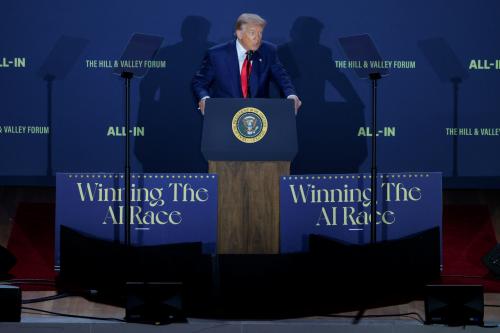The Trump administration’s aggressive trade policies and skepticism toward traditional security alliances have placed considerable pressure on relations between the United States and the European Union (EU). Meanwhile, U.S.-China strategic competition remains sharp. How will these twin dynamics across the Atlantic and Pacific interact with each other? Will it be possible for transatlantic coordination on China to deepen? Or will transatlantic divisions and differing threat perceptions of China push America and Europe in different directions on China?
To explore these challenges, the Brookings Global China Project convened six foreign policy experts with diverse areas of expertise, including on China, Europe, national security, and economic issues. Their written exchange addresses three central questions:
- What should the United States seek or expect from Europe in the context of its strategic competition with China?
- Why is China adopting a harder line toward Europe amid visible transatlantic rifts, and what does Beijing hope to achieve in its engagement with the continent?
- How is the European Union navigating its position between Washington and Beijing, and what kind of U.S.-EU-China relationship does Brussels believe best serves Europe’s long-term interests?
Their insights offer a timely window into the complexities—and strategic choices—shaping U.S.-EU-China triangular dynamics at a moment of global realignment. Their answers follow below:
Wants and expectations
What should the United States want or expect from Europe in relation to competition with China?Jonathan A. Czin
Realistically, it seems the United States should expect very little from Europe on China, given the strains in the transatlantic relationship. Moreover, the Trump administration has taken big steps backward on many of the key issues where alignment had been deepening, rolling back some export controls of high technology, de-emphasizing human rights, and pulling back from Taiwan. These two dynamics would seem to diminish the space for alignment on China policy.
That said, I have been struck that many European leaders have continued to say the right things about the challenge from China—such as European Commission President Ursula von der Leyen’s statement at the G7 about the risks created by China’s dominance of rare earth magnets. While many U.S. policymakers and observers have been frustrated by Europe’s inhibitions about aligning more closely on China, at this point, Europe seems unlikely to revert to its more accommodating policy toward China. Beijing—primarily through its own actions, most notably its support for Russia’s war against Ukraine—has just done too much to harden views across Europe. That suggests that room remains for alignment between the United States and Europe on China issues whenever Washington does return to a more serious approach toward competition with China.
Daniel S. Hamilton
European countries share many U.S. concerns about China. They are angry that Beijing supports Russia’s aggression against Ukraine and helps Moscow skirt Western sanctions. They are frustrated by China’s cyberthefts, intellectual property assaults, poor implementation of its World Trade Organization (WTO) obligations, and state-subsidized overcapacity in many industries. They are concerned that Beijing could exploit its control over materials critical to Europe’s economy, and they are wary of Chinese investments in strategic European industries. They are critical of China’s human rights abuses, its absorption of Hong Kong, its threatening stance toward Taiwan, and its contestation of maritime straits critical to European trade. EU leaders are troubled by China’s $350 billion trade surplus with the bloc. The July 2025 EU-China summit was tense; the only result was a joint statement on climate change.
Nonetheless, transatlantic alignment on China policy remains difficult, in part because the 27 EU member states do not always agree. Many have become China hawks, but some continue to prioritize economic opportunity. Moreover, imports from China have become critically important to European economies. Europeans are also concerned that Chinese producers shut out of the U.S. market could dump their products in Europe.
Michael E. O’Hanlon
To begin with a negative, the United States should not want, and should certainly not expect, much direct military help from Europe in any conflict against China. But the United States should be able to hope that European allies could handle European security crises largely on their own while American military forces were focused on conflict in Asia. In the current context, for example, this task would mean keeping Ukraine afloat and sovereign while also protecting NATO’s eastern flanks, especially in the small and vulnerable Baltic region, without much American help for a stretch of time.
Also, following what I called (in my 2019 book, “The Senkaku Paradox”) a strategy of integrated deterrence, similar to what former Secretary of Defense Lloyd Austin later advocated at the Department of Defense with that same phrase, Europe should continue to monitor—and to mitigate—its economic and strategic dependencies on China. The goal should be to avoid vulnerability to Chinese blackmail in a security crisis, and to be in a position to join with Washington in inflicting economic punishment against China in the event of a war in the Western Pacific. Tools of economic warfare may be among the most consequential for ending the conflict on acceptable terms; in this regard, we need to have escalation dominance over Beijing as an alliance.
Also, perhaps I am daydreaming, but it would be wonderful if creative geostrategic minds in Europe could help find a formula that Taiwan and China could both accept for future “reunification”—at least through some kind of commonwealth arrangement. I am not comfortable blithely assuming that we can simply manage the Taiwan question with our current policies and policy tools (though I support the policy of dual deterrence as the least-bad option for the foreseeable future). Since they are seen as having less historical baggage on the issue, European countries may be better positioned than the United States to catalyze this debate when the timing is right.
Susan A. Thornton
The most important issue for the United States and Europe to work together on with respect to China is how to handle the unprecedented nature of China’s competitive manufacturing colossus in a globalized economy. The United States and Europe, the two largest economies, should mount a joint effort at remaking global trade, finance, and corporate governance rules in order to lay the foundation for reduced conflicts of interest and protectionism, more distributed growth, and accountability for negative externalities. These are not only related to China and will certainly impinge on domestic governance issues, whether in a democratic or non-democratic system. States will have to sacrifice some sovereignty and bear dependency risks for the sake of a healthy global economy, as they have been doing since the advent of modern commerce. Neither the United States nor China is moving in this direction at the moment, so the hope would be that Europe could remain a strong standard-bearer for globalization (which will not be rolled back successfully, despite myriad current pronouncements) and work with others to build a consensus around rules and fairness. Economic exchange is fundamentally a win-win interaction that also gives actors a stake in continuing relations. We need more globalization, not less, but we also need commitments to better rules and better enforcement—and better diplomacy. My hope would be that Europe will continue to lead and insist on this.
Tara Varma
Europe must right-size the China challenge, both in the context of its evolving relationship to the United States, as well as independently from the United States. The profound transformation of the transatlantic relationship has raised questions about the credibility of the U.S. security guarantee to Europe. In the context of increased strategic competition, Europe understands it cannot afford to simply replace its security dependency on Washington with a similar dependency on another country.
Therefore, the United States must prepare for a Europe that acts on China in ways that may or may not converge with the United States. For instance, EU digital regulations could lead to a ban on TikTok, with little to no coordination with Washington.
Despite transatlantic divergences on China, the EU and the United States had previously managed to reach a common assessment on the People’s Republic of China’s strategic trajectory, which was partly developed during the EU-U.S. dialogues on China, the last of which was held in September 2024. These exchanges, which were meant to establish a common plan of action on China, haven’t yet resumed under the Trump 2 administration. As strategic competition in the U.S.-EU-China triangle intensifies, it remains in both the United States’ and the EU’s interest to share that perspective and to define policy on China on that basis.
Thomas Wright
The United States should want Europe to stand up for its own interests vis-à-vis China and to work together in a unified way through the European Union. Europe has taken a more competitive position toward China—not as a favor to the United States, but because it is in its interest to do so and because Beijing has played its hand so ineptly. Europe and the United States won’t always agree on every aspect of China policy, but if Europe is united and strategic in its approach, Washington and Brussels will be broadly aligned. If they are divided and incoherent, then we will see a significant transatlantic divergence.
There are some areas in which the United States should work more closely with Europeans. Take two examples. They should develop a shared understanding of how to deal with the challenges China poses to the global economy, including overcapacity, excessive dependence on China for critical minerals, and ensuring companies remain competitive with Beijing’s non-market practices. They should also work more closely together on technology, including continued U.S.-Netherlands cooperation on semiconductors and managing the risks and opportunities of artificial intelligence. Unfortunately, the Trump administration’s message is that it is not all that interested in transatlantic cooperation on China. This doesn’t mean that Europe will switch sides, but there will be lots of unrealized potential.
What does China seek from Europe?
Why is China taking such an unyielding and firm line on Europe these days, particularly in light of visible transatlantic rifts? What does China seek from Europe?Jonathan A. Czin
China’s approach to Europe seems to be to intensify rather than attenuate the conundrum facing U.S. allies that have been battered by the Trump administration’s omnidirectional trade war. I think Beijing sees little upside from pursuing a charm offensive with Europe and judges that transatlantic strains give it the upper hand with Europe, which is now stuck between a hostile United States and a recalcitrant China. I think Beijing’s ultimate goal is to demonstrate to these countries that they need to accommodate China—especially on trade, in the case of the EU—as the United States becomes a less dependable partner. This policy seems to be deliberate rather than accidental, and it is similar to the approach that Beijing is taking with U.S. allies and partners in the Indo-Pacific, which my colleague Allie Matthias and I recently outlined. This approach is not risk-free—Beijing could very well wind up driving Europe closer toward the United States. But Beijing probably judges that risk is manageable in light of the strained transatlantic ties, and because of Europe’s reluctance to press Beijing too hard even when the United States and Europe were more closely aligned during the Biden administration.
Daniel S. Hamilton
Beijing’s self-assurance is amplified by its perception that China is rising while the United States and Europe are declining. China’s rulers see an America beleaguered by social discord and political polarization, and a fragmented Europe unable to address serious competitiveness challenges and overly dependent on the United States. Now that a U.S.-China trade truce appears more likely than a bilateral trade war, Beijing has become more strident in its demands of Europe. It has matched EU trade restrictions with those of its own, doubled down on its partnership with Russia, and openly suggests that it could shut off the supply of critical materials if Europe is not more forthcoming regarding Chinese demands. At the top of that list is Chinese insistence that the EU lift its tariffs on imports of Chinese electric vehicles and its restrictions on exports of chipmaking equipment to China. Beijing also works assiduously to play individual European states and the European Commission off against one another, and the EU off against the United States. There are limits to these tactics, as Chinese companies need Europe’s large market. But Beijing doesn’t believe it needs to compromise on its most important priorities.
Susan A. Thornton
Beijing does not believe that current rifts in U.S.-European relations represent a fundamental reordering of the transatlantic alliance. The EU is continually frustrated that Beijing doesn’t take it seriously, but that is in large part because Chinese leaders see the EU as being in lockstep with and deferring to Washington on China policy, even in contravention of European interests. This is continuing, they believe, even with the EU under pressure from the Trump administration, as indicated by von der Leyen’s harsh comments on China at the G7 meeting in June. In some areas, Europe’s tough approach to China goes beyond Washington’s; for example, the EU has named China “the key enabler of Russia’s war” in Ukraine, and its rhetoric on Taiwan calls for “no changes to the status quo by force” as opposed to “no changes to the status quo by either side.”
China seeks an economic partnership with Europe that can continue to contribute to the strengthening and growth of the Chinese economy; this requires European acceptance of China’s increasing relative weight in the international system. However, Europe fears this on account of ideological and system differences and concerns about the EU’s future economic competitiveness and unfair Chinese commercial practices. Certainly, European acceptance will only come if China is prepared to be a responsible major power that will constrain and trade its own narrow interests for the sake of its broader interest in creating “a community of shared future.” Currently, Beijing is far from meeting its own rhetoric on this score, especially given its preoccupation with multiple territorial disputes with its neighbors.
Tara Varma
China’s line on Europe hasn’t changed recently. The lack of trust is structural. China hasn’t provided a substantial offer to reinforce cooperation with Europe since 2019, when the EU’s strategic outlook on China was published. 2019 was also the year of the last EU-China joint declaration, following the EU-China summit, where both sides agreed to cooperate on technology transfers, expansion of market access on both sides, and on the South China Sea, among other issues. At the time, the EU and China were also intent on finalizing the Comprehensive Agreement on Investment, which the European Parliament ultimately voted to postpone in December 2020, citing China’s human rights violations in Hong Kong and Xinjiang. A few months later, the EU, the United Kingdom, Canada, and the United States jointly sanctioned Chinese officials over human rights violations in Xinjiang. Beijing responded by sanctioning 10 EU parliamentarians. The stalemate has lasted ever since, with a potential thaw upcoming in the fall as a delegation of Chinese politicians is set to visit the European Parliament for the first time in seven years.
For its part, the EU’s China strategy defines the bilateral relationship as a triptych of cooperation, economic competition, and systemic rivalry. In that sense, the COVID-19 pandemic is a landmark moment; it damaged the EU-China bilateral relationship by helping Europe realize that its economic dependency on China can be weaponized to its detriment. China’s recent decision to restrict rare earth materials to both Europe and the United States highlights the fact that it continues not only to weaponize dependencies, but also that it does not differentiate its economic statecraft between Europe and the United States.
Additionally, China’s support for Russia in the latter’s war in Ukraine has led to further European awareness of the risks carried in increasing and deepening relations with Beijing.
China evidently benefits from the current complex transatlantic developments. While it could leverage ongoing power dynamics to gain privileged access to European technology and markets, to date, it is making the deliberate choice not to.
Thomas Wright
Beijing would like to split the Europeans away from the United States, but it is not willing to do anything meaningful or difficult to accomplish this. It won’t cease supporting Russia’s war against Ukraine or stop reconstituting its military because Xi Jinping is serious about his no limits partnership with Vladimir Putin. China won’t fundamentally change its policy on stimulating domestic consumption to reduce the overcapacity problem (the flood of Chinese manufacturing) in the European market. Ultimately, China wants a divided Europe where it can play one country off against another, using its disproportionate economic weight and influence. It has something to work with—there are a number of EU member states that have a much more accommodationist policy toward Beijing. If China succeeds, it can reduce Europe’s ability to punch its weight and to work with the United States to shape the international order.
Daniel S. Hamilton
While some Europeans portray themselves as bystanders in U.S.-China conflicts, most European leaders understand that they are more deeply bound to the United States than to China. Brussels and Washington have agreed to work more closely to disentangle their economies from uncomfortable dependencies on China; pressure Beijing to stop supporting Russian aggression; address China’s non-market practices, unfair competition, and lack of reciprocity; and deny critical technologies, data, or goods to China that could advance Beijing’s military capabilities and revisionist goals. However, bilateral EU-U.S. tensions often get in the way of transatlantic efforts to meet the China challenge. The July 2025 EU-U.S. trade “deal” has yet to be finalized and could fall apart. The two parties continue to dispute issues ranging from tech regulations and privacy rules to aircraft subsidies, agricultural support schemes, and market discrimination.
China profits from the inability of the United States and Europe to align. Nonetheless, Brussels has become far more assertive with Beijing. It has blacklisted mainland Chinese firms and banks for trading with Russia. Subsidy concerns have led it to impose high tariffs on Chinese electric vehicles and to investigate Chinese railway, wind turbine, and security equipment makers. It has excluded Chinese medical device producers from large public tenders. Further investigations and restrictions are likely.
Susan A. Thornton
The EU needs a diplomatic adjustment with respect to its China policy, which currently does not serve its interests. European upset with China over its relations with Russia is understandable, but not productive. It is clear that China cannot play a decisive role in halting Russia’s war in Ukraine, nor can it afford to alienate Russia. It currently trades with both Russia and Ukraine while showing diplomatic favor to Putin. Russia’s strategic significance for China will not change. But the questions of Europe-Russia relations and Russia’s future role in the international system are of great interest to China. European dedication to a future “Russia collapse scenario” will be vociferously opposed by China and will doom EU-China relations. An informal EU-China discussion of future European security prospects could dispel misperceptions and lead to more productive interactions.
In the long term, European interests will be served by a continuing strong transatlantic axis, the integration of a quiescent Russia into a future sustainable European security order, and a productive relationship with a China that contributes to global order. Chinese and European interests do not conflict on any of these strategic futures. Europe may believe that it cannot maintain a strong transatlantic axis without sacrificing its interests with Beijing, but this underrates European diplomacy and leadership, which is much needed now.
Tara Varma
Europe’s relationship with the United States remains existential to the EU’s survival, and, therefore, Europe is preoccupied with redefining the transatlantic relationship for its security and economic future. In contrast, Europe’s relation to China is primarily economic, and Brussels has focused on de-risking the relationship for almost a decade. When Europe’s relations with both the United States and China are strained, most European political capital is concentrated on trying to fix the Washington-Brussels relationship.
Even if China is presenting challenges for Europe in terms of competitiveness, the green transition, and particularly, security via-à-vis Russia, all these issues go far beyond the scope of the bilateral EU-China relationship. Europe faces a systemic competition with China but can afford to simply coexist with Beijing. Contrary to China, Europe’s competition with the United States isn’t of a systemic nature, and Europe’s security dependency on Washington is a matter of fact, whose untangling will take time. Europe’s cooperation with the United States is much deeper and rooted in trade, collective security, coordination in multilateral institutions, and people-to-people exchanges. The transatlantic relationship’s foundations are undergoing seismic shifts, and the relationship itself is being redefined.
As Europe works on redefining its role in the transatlantic relationship, it needs to formulate a new China strategy that addresses the scale, speed, and nature of the China challenge.
Thomas Wright
These two relationships—EU-U.S. and EU-China—are on completely separate tracks. When it comes to the United States, the EU has adopted a “hug them close” policy, trying to unilaterally reduce tensions and develop closer personal ties to the Trump administration. This is partly because the Ukraine war looms so large and partly because EU officials assess that the EU has limited leverage vis-à-vis the United States. When it comes to China, EU Commission President Ursula Von der Leyen said that relations are at an “inflection point.” Much of this relates to economics. As China has been shut out of U.S. markets, its exports to the EU have soared (especially in industrial robotics) while EU exports to China have plummeted. The EU has taken a series of actions against China, including tariffs on Chinese electric carmakers, an investigation of two Chinese e-commerce firms, and steps to exclude Chinese medical equipment makers from public procurement. It has also sanctioned two Chinese banks over their support for Russia. The EU-China summit was tense, and relations look set to continue to be fraught. Overall, the EU is likely hoping it can stabilize relations with the Trump administration and show that there is scope for transatlantic cooperation on challenges from China.
The Brookings Institution is committed to quality, independence, and impact.
We are supported by a diverse array of funders. In line with our values and policies, each Brookings publication represents the sole views of its author(s).














Commentary
Between Washington and Beijing: How Europe fits into US-China strategic competition
September 11, 2025